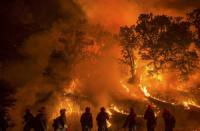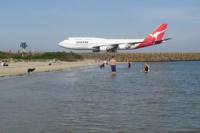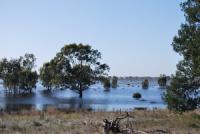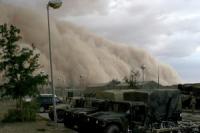-
How climate change impacts the economy
Warmer temperatures, sea level rise and extreme weather will be deleterious to the U.S. economy: Rising temperatures damage property and critical infrastructure, impact human health and productivity, and negatively affect sectors such as agriculture, forestry, fisheries, and tourism. The demand for energy will increase as power generation becomes less reliable, and water supplies will be stressed. Damage to other countries around the globe will also affect U.S. business through disruption in trade and supply chains.
-
-
As global temperatures climb, risk of armed conflict likely to increase substantially
As global temperatures climb, the risk of armed conflict is expected to increase substantially, according to experts across several fields. Synthesizing views across experts, the study estimates climate has influenced between 3 percent and 20 percent of armed conflict risk over the last century and that the influence will likely increase dramatically.
-
-
Melting of Himalayan glaciers has doubled in recent years
Almost one billion people depend on melt-water from Himalayan glaciers for the water they need, but global warming has dramatically increased the pace of glacier melting. A new analysis, spanning forty years of satellite observations across India, China, Nepal and Bhutan, indicates that glaciers have been losing the equivalent of more than a vertical foot and half of ice each year since 2000 — double the amount of melting that took place from 1975 to 2000.
-
-
A “Responsibility to Prepare”: A strategy for presidential leadership on the security risks of climate change
Presidential candidates are offering their plans on climate change, and it’s a competition over who’s the most ambitious. That’s good news, given that it’s a major security threat that requires a major response. Thus far, most of the candidates’ plans understandably focus on reducing greenhouse gas emissions and transitioning to a low-carbon economy. These steps are critically important, not least because the world will likely experience significant security disruptions in the future if the scale and scope of climate change are not reduced. Caitlin Werrell, Francesco Femia, and John Conger write in War in the Rocks that this is only half a strategy. Indeed, if there is a silver lining to climate change and the attendant security risks, it’s that we can see many of these changes coming. American scientists, the U.S. government (see this administration’s National Climate Assessment) and private industry have all shown they are capable of modeling climate change futures with a high degree of certainty compared to other trends. A climate model from 1967 still has a strong predictive capacity. Exxon’s own internal calculations and climate modeling from 1982 about where emissions would likely be in the future, including by 2020, were fairly spot-on. A political scientist in 1967 or 1982 would have had much more difficulty predicting what the political landscape would look like in 2020 than she or he would have making predictions about the climate.
-
-
More frequent downpours of torrential rain with global warming
The frequency of downpours of heavy rain—which can lead to flash floods, devastation, and outbreaks of waterborne disease—has increased across the globe in the past 50 years, a period when global warming also intensified
-
-
Climate change is destroying a barrier that protects the U.S. East Coast from hurricanes
Severe hurricanes can cost up to hundreds of billions of dollars in damages. The destruction left in the wake of Atlantic hurricanes has been increasing over time in recent decades. A new study suggests that climate change could soon eliminate an atmospheric barrier that protects much of the U.S. East Coast from powerful hurricanes.
-
-
Climate change already affecting global food production—unequally
The world’s top 10 crops — barley, cassava, maize, oil palm, rapeseed, rice, sorghum, soybean, sugarcane, and wheat — supply a combined 83 percent of all calories produced on cropland. Yields have long been projected to decrease in future climate conditions. Now, new research shows climate change has already affected production of these key energy sources — and some regions and countries are faring far worse than others.
-
-
The economic cost of devastating hurricanes and other extreme weather events is even worse than we thought
June marks the official start of hurricane season. If recent history is any guide, it will prove to be another destructive year thanks to the worsening impact of climate change. If this is not bad enough, there is this: a meaningful assessment of the costs of climate change – using basic economic principles I teach to undergrads – paints a scary picture indeed.
-
-
More intense wildfires are here to stay, and we need to adapt

Update on state of Canada’s mountain regions looks at human scale of ecological disaster wrought by changing climate. “Events that a decade ago we would call ‘100-year events’ are quickly becoming the norm,” said one researcher. We need to talk “about ways we can coexist with fire because it is our new reality.”
-
-
Rising seas threaten Australia’s major airports – and it may be happening faster than we think

Most major airports in Australia are located on reclaimed swamps, sitting only a few meters above the present-day sea level. And the risk of sea level rise from climate change poses a greater threat to our airports than we’re prepared for. Given the significant disruption cost and deep uncertainty associated with the timing of sea level rise, we must adopt a risk-based approach which considers extreme sea level rise scenarios as part of coastal infrastructure planning.
-
-
Rural areas more vulnerable to sea-level rise

Type “sea-level rise” in an internet search engine and almost all the resulting images will show flooded cities. But there is a growing recognition that sea-level rise will mostly impact rural land–much of it privately owned—where existing knowledge is insufficient o best inform private and public decisions on how to cope with the threat.
-
-
Can we prepare for climate impacts without creating financial chaos?
Likely sooner than we think, the destruction that warmer global temperatures are inflicting — through record floods, wildfires, droughts, and hurricanes — could physically overwhelm our ability to maintain many communities in their existing form. Communities face a tricky dilemma as climate changes: How to prepare for impacts without scaring away homeowners and investors and setting off a damaging economic spiral.
-
-
Profitable climate change solution
A seemingly counterintuitive approach – converting one greenhouse gas into another – holds promise for returning the atmosphere to pre-industrial concentrations of methane, a powerful driver of global warming.
-
-
Be afraid of the world, be very afraid
Who’s right: Cassandra or Dr. Pangloss? Are we on the brink of serious trouble, as Cassandra of Greek myth prophesied, or is all for the best “in this best of all possible worlds,” as the fictional Pangloss insisted in Voltaire’s Candide? “I’m generally a fairly upbeat guy, despite my realist proclivities and my recurring frustrations at the embarrassing state of U.S. foreign policy,” Stephen M. Walt writes in Foreign Policy. “But today I’m going to indulge my inner Cassandra and describe the five bad things that worry me today. I hope I’m wrong.”
-
-
The costs of extreme weather

An expert tells lawmakers that there is one “underappreciated” fact in discussions about the costs of climate change: “small shifts in long-term average conditions — what we call climate — can have a large effect on the frequency of extreme weather events.” Examples: “In 2017, Hurricane Harvey caused an estimated $125 billion in losses, with an estimated 200,000 homes experiencing damage. Ongoing flooding in the upper Midwest is sure to produce agricultural losses alone in the billions of dollars, and extreme drought across much of the U.S. in 2012 caused $33 billion in losses.”
-
- All
- Regional
- Water
- Biometrics
- Borders/Immig
- Business
- Cybersecurity
- Detection
- Disasters
- Government
- Infrastructure
- International
- Public health
- Public Safety
- Communication interoperabillity
- Emergency services
- Emergency medical services
- Fire
- First response
- IEDs
- Law Enforcement
- Law Enforcement Technology
- Military technology
- Nonlethal weapons
- Nuclear weapons
- Personal protection equipment
- Police
- Notification /alert systems
- Situational awareness
- Weapons systems
- Sci-Tech
- Sector Reports
- Surveillance
- Transportation
Advertising & Marketing: advertise@newswirepubs.com
Editorial: editor@newswirepubs.com
General: info@newswirepubs.com
2010-2011 © News Wire Publications, LLC News Wire Publications, LLC
220 Old Country Road | Suite 200 | Mineola | New York | 11501
Permissions and Policies
Editorial: editor@newswirepubs.com
General: info@newswirepubs.com
2010-2011 © News Wire Publications, LLC News Wire Publications, LLC
220 Old Country Road | Suite 200 | Mineola | New York | 11501
Permissions and Policies
